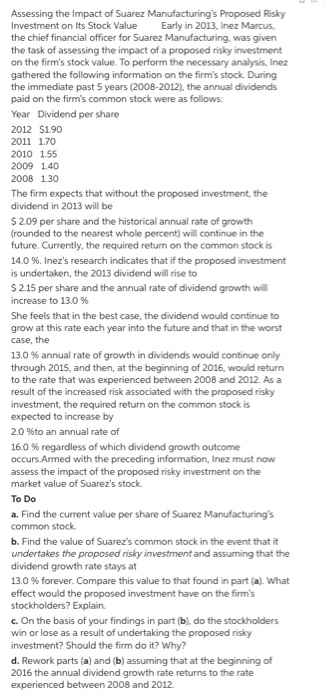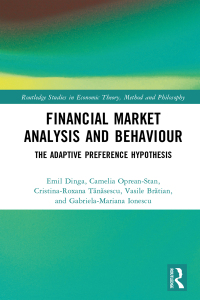Assessing the Impact of Suarez Manufacturing's Proposed Risky Investment on Its Stock Value Early in 2013, Inez Marcus the chief financial officer for Suarez Manufacturing, was given the task of assessing the impact of a proposed risky investment on the firm's stock value. To perform the necessary analysis, Inez gathered the following information on the firm's stock Duning the immediate past 5 years (2008-2012), the annual dividends paid on the firm's common stock were as follows Year Dividend per share 2012 $1.90 2011 170 2010 155 2009 1.40 2008 130 The firm expects that without the proposed investment, the dividend in 2013 will be $ 2.09 per share and the historical annual rate of growth rounded to the nearest whole percent) will continue in the future. Currently, the required return on the common stock is 14.0 %. Inez's research indicates that if the proposed investment is undertaken, the 2013 dividend will rise to $ 215 per share and the annual rate of dividend growth will increase to 13.0 % She feels that in the best case, the dividend would continue to grow at this rate each year into the future and that in the worst case, the 13.0 % annual rate of growth in dividends would continue only through 2015, and then, at the beginning of 2016, would return to the rate that was experienced between 2008 and 2012. As a result of the increased risk associated with the proposed risky investment, the required return on the common stock is expected to increase by 2.0 %to an annual rate of 16.0 % regardless of which dividend growth outcome occurs.Armed with the preceding information, Inez must now assess the impact of the proposed risky investment on the market value of Suarez's stock. To Do a. Find the current value per share of Suarez Manufacturing's common stock b. Find the value of Suarez's common stock in the event that it undertakes the proposed risky investment and assuming that the dividend growth rate stays at 13.0 % forever. Compare this value to that found in part (a) what effect would the proposed investment have on the firms stockholders? Explain. c. On the basis of your findings in part (b), do the stockholders win or lose as a result of undertaking the proposed risky investment? Should the firm do it? Why? d. Rework parts (a) and (b) assuming that at the beginning of 2016 the annual dividend growth rate returns to the rate experienced between 2008 and 2012







